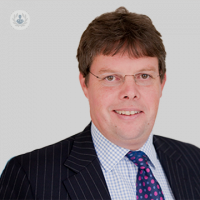Swallowing problems after head & neck cancer treatment
Written in association with:Patients who are treated with chemotherapy and radiation for head and neck cancer develop side effects both during and in the long term after treatment. In this article, expert consultant clinical oncologist Professor Chris Nutting discusses what swallowing problems may occur after cancer treatment in the head and neck.

Why do patients have trouble swallowing after head and neck cancer treatment?
Surveys of patients after treatment suggest that difficulties with swallowing are one of the highest reported complications of treatment and occur in around 70 per cent of patients. The swallowing problems are caused by scarring and stiffness of the tissues treated, which in turn slows down the contraction of muscles required for a normal swallow. This effect is seen across the majority of patients who have head and neck cancer treatment with chemotherapy and radiation.
What exactly should a patient expect in regards to swallowing after having cancer treatment?
Patients typically complain that the types of food that they can swallow is reduced and that their dietary repertoire is narrowed. When they do eat, it often takes a long time and they complain that their food sometimes goes cold because they are slow eaters. There are some foods which some patients can never manage.
Generally speaking, patients prefer liquid and softer foods, such as soups, pastas, mashed food, and casseroles, which are easier to swallow compared to more solid foods like meat. While many patients manage to maintain their nutrition adequately, they may find certain situations difficult, for example eating in public at a restaurant with friends or situations where they are eating and talking at the same time.
What exercises can patients do to improve swallowing after head and neck cancer treatment?
Exercises given to patients by a speech and language therapist can help maintain the muscle function before and during radiotherapy and can lead to significant improvements afterwards.
Do different cancer treatments have different results with swallowing?
My main research area has been to reduce the side effects of treatment in head and neck cancer patients and I have developed radiation techniques which reduce the amount of radiation delivered to some of the key muscles involved in the swallowing process.
In a recent trial, we demonstrated that patients who had muscle-sparing radiation improved their swallowing function by 25 per cent compared to patients with standard radiation. This is a new treatment which patients should ask about when they see their head and neck radiotherapy consultant.
How will swallowing improve years after treatment, and will it be a long-term difficulty?
After treatment, swallowing does generally and slowly improve. Most patients report that a year or two years after treatment, that their swallow function is around three-quarters of their pre-treatment function. Other issues which contribute to this are poor taste and dryness in the mouth and throat. I continue to develop new treatment techniques for patients to try to avoid these other side effects.
If you have recently had or are currently undergoing neck or head cancer treatment and would like to book a consultation with Professor Chris Nutting, you can go to his Top Doctors profile and schedule a visit.


